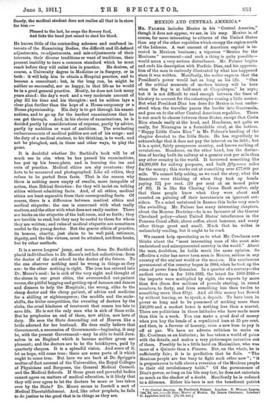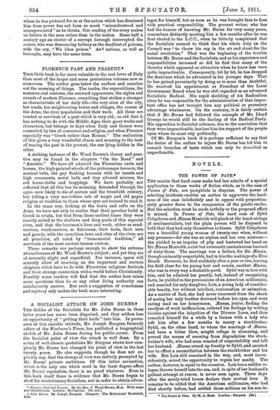MEXICO AND CENTRAL AMERICA.*
Mn. PALMER includes Mexico in his "Central America," though it does not appear, we see, in his map. Mexico is, of course, far more interesting to citizens of the United States than any of the other republics which occupy the region north of the Isthmus. A vast amount of American capital is in- vested in Mexican business ; a vigorous "Mexico for the Mexicans" movement—and such a thing is quite possible— would mean a very serious disturbance. Mr. Palmer begins and ends his description with Porfirio Diaz, and his apprecia- tion of the man is curiously illustrated by what has happened since it was written. Manifestly, the writer expects that the President's power would last as long as his life. "One of the critical moments of modern history will be here when the flag is at half-mast at Clitipultepee," he says ; but it is not difficult to read enough between the lines or his story to account for the catastrophe coming a little sooner. But what President Diaz has done for Mexico is best under- stood when the traveller passes the border into Guatemala, and goes on to the other Central American republics. There is not much to choose between these States, except that Costa Rica stands easily at the head, and Honduras, not quite so easily, for Nicaragua is a formidable rival, at the bottom. "Happy Little Costa Rica" is Mr. Palmer's heading of the chapter devoted to the little State. He has regretfully to acknowledge that it does not pay the interest on its debt ; but it is a quiet, fairly prosperous country, and knows nothing of revolutions. Honduras, on the other hand, has the distinc- tion of having built its railway at a greater cost per mile than any other country in the world. It borrowed something like £4,300,000 for railway purposes, and built fifty-seven miles for the money; this works out at something over £77,000 per mile. We cannot help asking, as we read the story, what the financiers were thinking of when they took up bonds paying 124 per cent. (10 per cent at an issued price of 80). It is like the Charing Cross Bank matter, only that these people knew what they were about and counted on palming off their investments on ignorant out- siders. To a mind untutored in finance this looks very much like swindling. Mr. Palmer has many interesting chapters, about the Monroe Doctrine—he is no favourer of the Grover Cleveland policy—about United States' interference in the Panama Canal affair, about coffee, about bananas, and many other things great and small. Much that he writes is melancholy reading, but it ought to be read.
We cannot help speculating as to what Mr. Creelman now thinks about the "most interesting man of the most mis- understood and misrepresented country in the world." About the man, doubtless, he holds mach the same opinion. So effective a ruler has never been seen in Mexico, seldom in any country of the ancient world or the modorn. His continuous government of the country began in 1884, when he took up the reins of power from Gonzalez. In a quarter of a century—the earliest return is for 1884-1885, the latest for 1909-1910— the imports were multiplied by eight, the exports by more than five (from five millions of pounds sterling, in round numbers, to forty, and from something less than twelve to something more than fifty). And all this money has flowed by without leaving, so to speak, a deposit. To have been in power so long and to be possessed of nothing more than £40,000 and a modest home is nothing less than a marvel. There are politicians in those latitudes who have made more than this in a week. You can make a good deal of money when you buy the bonds of a repudiated loan at 25 per cent. and then, in a fervour of honesty, raise a new loan to pay it off at par. We have no adverse criticism to make on Mr. Creelman as an historian; he has taken a world of pains with the details, and makes a very picturesque narrative out of them. Possibly he is a little hard on Maximilian, who was more of a Quixote than a Pizarro. But, on the whole, he is sufficiently fair ; it is in prediction that he fails. "The Mexican people are too busy to fight each other now "; "it is preposterous to talk about a reversion of the Mexican people to their old revolutionary habit." Of the permanence of Diaz's power, so long as his life may last, he does not entertain so much as the shadow of a doubt. Manifestly he is reduced to a dilemma. Either his hero is not the beneficent patriot
• (1) Central America. By Frederick Palmer. London : T. Werner Laurie. tips, 6d. net.)—(2) Dias; Master of Mexico. By James Creelman. Londont D. Appleton and Co. [7s. 6d. net.]
whom he has pictured for us or the nation which has dismissed him from power has not been so much "misunderstood and misrepresented" as he thinks. Our reading of the story makes us believe in the man rather than in the nation. Some half a century ago an elector of a corrupt borough interrupted the orator, who was denouncing bribery as the deadliest of poisons, with the cry, "We likes poison." .A.na. nations, as well as boroughs, may have the same taste.







































 Previous page
Previous page